
Publisher:
Bonnie King
CONTACT:
Newsroom@Salem-news.com
Advertising:
Adsales@Salem-news.com

~Truth~
~Justice~
~Peace~
TJP
Mar-04-2012 04:30

 TweetFollow @OregonNews
TweetFollow @OregonNews
Nazi Germany's Goering Brothers: Unwitting and Humble Saviors of the Jews
Tim King Salem-News.comLike Oskar Schindler, Albert Goering was a German Savior of Jewish lives.
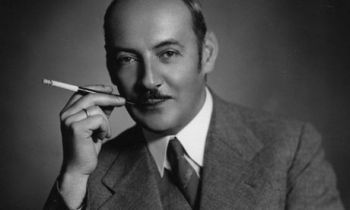 Albert Goering |
(SALEM) - From my study of history, there really have always been two men named Hermann Goerman.
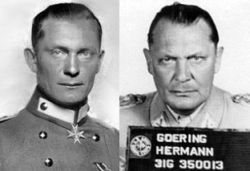 Hermann Goering- dashing WWI Ace, |
One is the fabled World One Ace who flew with the 'Red Baron', Manfred Von Richtoffen, then replaced him after his death as commander of the famed 'Flying Circus' squadron, and the other, is the fat, drug-addicted Nazi slug Hermann Goering who started Hitler's Gestapo, or secret police. They are the same man, as different as they may seem.
Now, thanks to the research of Louis Bülow, and an acquaintance in Denmark, Dr. Nellie Deutsch, I know a third face in this story, and it isn't, thank God... another image of the Nazi henchman shown on the left, it is that of his brother, Albert, shown on the right, who was a kinder, gentler Goering... and an avid hater of Nazis and their politics of mass murder and evil brutality, as hard as that might be to believe.
 |
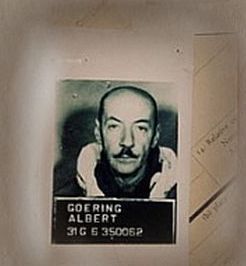 |
The fact that he was able to remain an outspoken critic of multiple aspects of Hitler's human extermination plan, and use his brother's position immediately under Adolf Hitler- as his tool for freeing Jews, is in itself vastly amazing, especially considering the level of cruelty and retaliation the Nazis were famous for.
 |
Like a true renegade, he basically told the whole Third Reich to take a hike. Related to Hitler's number two man, the famous aviator Hermann Goering, who earned the coveted 'Blue Max' (Pour Le Merit) in WWI, Albert Goering too pulled off amazing feats... as a humanitarian, and ultimately, like Oskar Schindler, saved larger numbers of Jewish people from certain death[1].
The two brothers are like the polar ends of a magnet; in some ways one was as good, as the other was bad. However nothing measures up to the cruelty Hermann Goering was truly responsible for in plotting the end of the Jews and so many other unfortunate people rounded up in mass, like the Roma, (Gypsy), and as Bülow says below on the Website, auschwitz.dk: all who were viewed as out of sync with the Nazi movement, like reporters, were the first to go.
- "... Hermann Goering was instrumental in creating the first concentration camps for political dissidents and a prominent leader of the Final Solution, the murder of 6,000,000 Jews. Next to Hitler the man who played the largest part in the shaping of the Nazi inferno."[2]
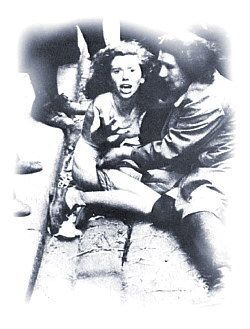 Albert Goering cared... auschwitz.dk |
It seems that at the end of the day, the only person of any real applicable value in an oppressed nation or culture, is one who willingly enters the game as a vocal critic of his or her own government; this philosophy was abandoned in many ways by media, which finds a government press release to be credible when often they should not, yet remains the very mark of excellence for the best activists and reporters.
The world is indeed low on reputable people who are willing to call our own governments into question; in many countries it leads activists and reporters to a death sentence, and also the common citizens, and this was also true of the Berliners who largely accepted the anti-Jewish government of Hitler. Then, as today in the U.S., where laws are being passed to greatly curtail our guaranteed civil right, an overbearing government strapped on its XXXXL jack boots and proceeded to force its citizens into compliance.
Bülow explains that the younger brother of Hermann Goering, "loathed all of Nazism's inhumanity and at the risk of his career, fortune and life, used his name and connections to save many Jews and gentiles. He is credited with many acts of kindness, small and large. Even today survivors remember once he took off his jacket, went down on his knees, and scrubbed a sidewalk together with Jews who were ordered by the Nazis to do so in public as a humiliation."
He goes on to talk about the parallel with Oskar Schindler, whose story awakened a new generation to the realities of the Holocaust. Sadly, the story of Albert Goering is almost unknown.
Bülow contends that, "...he was shoved into obscurity by the enormity of his brother's crimes" and while this is true, he was also shoved into war crime trials by the occupying American forces, who were too dense to realize his intrinsic value to the survival of so many victims, and far more in the way of in your face acts and statements against the Nazis.
After the war Albert Goering was interrogated during the Nuremberg Trials and in spite of the fact that many Holocaust survivors testified on his behalf, was imprisoned for several years, Bülow adds, "for his name alone ..."
Recently discovered reports hidden in the British archives, prove how Albert Goering actually saved many lives - both Jews and non-Jews - from the horrors of Hitler's highly efficient death machine. Louis Bülow brings interesting facts to light, taking the reader down this little traveled road of internal resistance on the part of one man at what can only be considered an epic time.
Author James Wyllie, in his book, The Warlord and the Renegade, explores in detail the relationship between these two brothers who hailed from a noble German family[3].
 Click to order: Amazon.com |
In its review, WWII History, January 2007 wrote, "The world, it seems, knows who Hermann Goering was. His brother, Albert, is less well known, a fact that will change with the publication of James Wyllie's book about the Nazi Reichsmarschal's younger sibling...Wyllie documents the many instances when Albert, at the risk of his own safety, assisted scores of concentration camp and death camp inmates to escape their fates...The Warlord and the Renegade deserves to be on every history buff's bookshelf." [4]
As different as night and day, evil and good, black knight vs white knight; the two brothers always maintained a good relationship. I have to wonder if the good brother kept his side of the bargain because he knew not doing so could cost him his life? This and many other questions can be found if the curious sets out to do so.
I gathered while reading about, The Warlord and the Renegade, that the book possibly delves too deeply into Hermann Goering's good points, which is not the type of appraisal I am looking for, unless again, you are talking about the Hermann Goering who went on to lead the honorable 'Flying Circus' squadron or Royal Prussian Jagdstaffel 11 ("No 11 Fighter Squadron") as it was properly known during the 'Great War', the war to end all wars.... (yeah right) World War One. One thing, Naziism had not manifested and while there were anti-Jewish sentiments in Germany, and other parts of Europe, many German WWI heroes were Jewish and they were honored at the highest level[5].
The beginning the Nazi period and eventual outbreak of World War Two placed a strain on millions of relationships; most Germans turned on their Jewish neighbors, but not all. While Hermann Goering would become chief henchman, his brother remained true to his deep moral convictions, as only a small number of his German brethren could. It is important to remember that this is one of the very few people in Third Reich Germany who could get away with insulting Hitler, very few. And while his privileged position allowed him to help Jews, it would have more easily allowed the opposite. This man's actions are highly commendable to say the least.
 |
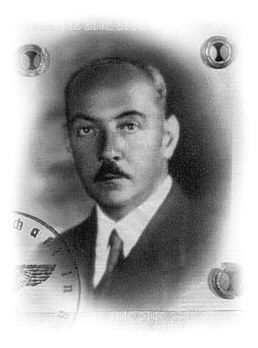 A younger Albert Goering |
Louis Bülow writes about how Albert soon became disenchanted with the Nazis, then moved to Austria.
- "He worked in the Tobis Sacha film studios in Vienna and often spoke out against Adolf Hitler and the Nazis. Once the Germans marched into Austria, he might be in trouble, but Hermann Goering protected him and kept him out of the hands of the Gestapo.
- When the SS rounded up his former boss, a Jew named Oskar Pilzer, Albert Goering exerted all of his influence to have Pilzer freed and helped him and his family get out of the country.
- In his authoritative book The Devil's Disciples the author Anthony Read tells that Albert Goering spent much of his time, both then and right through until 1945, doing what he could to help individual Jews to survive, often with his brother's collusion.
- The actress Henny Porten had been forced out of the German film industry because she was married to a Jew - Albert Goering was asked to intervene and he arranged a contract for Henny."
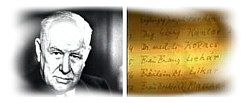 |
Albert Goering would use his influence time and time again to save people from the Nazis.
When they threatened the famous composer Franz Lehar because his wife was Jewish, Goering used his influence to get "honorary Aryan status" for Frau Lehar. He ensured his brother's guarantee that Lehar's wife would remain safe.
Again, Bülow brings to a point the increasing awareness Albert Goering experienced, with Naziism on the rise.
 |
 Guido Knopp by Stuart Mentiply |
- As the brutality of the Nazis accelerated with murder, violence and terror, the seeds of their plan for the total extermination of the Jews dawned on Albert Goering in all its horror - he saw the Jews as mothers, fathers, children. So he decided to act and helped many Jews escape from Vienna by procuring travel documents.
- Professor Guido Knopp, head of history and current affairs at ZDF, a German national television channel, tells in his book Hitler's Holocaust that Albert Goering was always willing to help those in need. On one occasion - in the autumn of 1943 - he signed passports with his own hand for a Jewish family he had befriended. Once he persuaded SS chief Heydrich to release some Czech resistance fighters from the cellars of the Gestapo.
- Richard Sonnenfeldt, chief interpreter and youngest member of the American prosecution team at the Nuremberg War Crimes Trial, later recalled how the Reichmarshal enjoyed displaying his power to Albert by freeing Jews from the concentration camps. "Albert would go to his brother Hermann and say, 'Hermann you're so big and so powerful, and here's a Jew who's a good Jew and doesn't belong in a concentration camp'," Sonnenfeldt said.
- " 'Can't you just sign a paper?' And Hermann would say, 'This is absolutely the last time I'm going to do this, don't come back'," said Sonnenfeldt, 80, on a tour of Germany to promote a book about his Nuremberg experiences Mehr als ein Leben. "A month later, Albert would be back," he said. "We found a hundred people on Albert's list that were freed. All because Goering had such a need to show off to his younger brother." [6]
Physician Laszlo Kovacs, who took care of Albert Goering beginning in 1939, recalled hearing Goering say: "I defy Hitler, my brother and all the National Socialists."
Goering began giving Kovacs money and a joint bank was set up at the Bank Orelli in Bern. Kovacs used these funds to assist Jewish refugees trying to get to Lisbon. After the Germans occupied Italy in 1943, Goering had Kovacs assigned as his personal doctor.
Louis Bülow writes:
- "When Albert was stationed in Bucharest, Rumania, two Nazi officers saw him standing on a balcony and recognized him as the brother of Hermann Goering. They did the Nazi salute 'Heil Hitler' in front of him, but Albert coldly replied 'you can kiss my ass ...'"
Albert Goering would later become export director of the Czech arms factory Skoda. Here again, Goering was able to prevent a number of people from being shipped out to death camps, they were employees, and among them; factory director Jan Moravek and his family, who protected fighters from the Czech Resistance movement against Nazism.
It becomes even more interesting with revelations published in, The Hitler Kiss A Memoir Of The Czech Resistance, by Christina Vella and Radomir Luza are taken into account.
 Click to Order from: Amazon.com |
In this autobiography, we learn that Albert made jokes about Nazis and spilled a few drops of information. In 1940, he learned in confidence, the date of the German invasion of France. He immediately reported the information to the British. Again, remember that the emerging information on Goering was in British government custody all of this time[7].
Louis Bülow lists many examples of Albert Goering's refusal to acknowledge or respect the Nazi party, and it is all quite remarkable.
- Karel Sobota, for several years assistant to Albert Goering, worked in the Exports Department of Skoda and endangered himself by taking actively part in the Czech Resistance movement against Nazism. Karel Sobota later recalled how Albert Goering refused to return the Nazi salute when Nazi officers visited Skoda. At that time, this refusal was sufficient for one man to be imprisoned or worse.
- Albert Goering insisted that all people, no matter the rank or position, be announced to him before entering his room. Karel Sobota later told how a high ranking SS officer one day arrived in Skoda and quickly entered directly in Albert Goering's room with Sobota unsuccessfully trying to block him. In a rage, Goering expelled the Nazi from his room and ordered him to wait outside. Then Goering begged Karel Sobota to come in and sit down by him, he calmly talked about the weather, his family and they both examined some of Albert's picture albums. This took about thirty or forty minutes.
- Said Albert Goering: - 'Well, Herr Sobota, now it is time to let that Nachtwachter talk to me. Please allow him to come in ..' (night watcher, in German, reference to the black SS uniform).
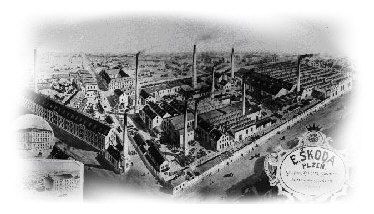
- The employees were very grateful to Albert Goering due to the human treatment he always gave to all Czechs and people of other nationalities. At that time passive resistance was the order of the day. Any work in the lines of production or in the administrative area always took much more days to be done than was initially expected.
- Karel Sobota recalled how Albert Goering looked the other way as the Czech employees made wrong translations of catalogs, 'forgot' to do tasks assigned to them, left work unfinished in their desks or 'lost' important documents. The employees risked their lives - had they been caught red-handed by the Gestapo or the SS, they had been executed on the spot.
At the conclusion of World War Two, Hermann Goering was tried for war crimes and crimes against humanity at Nuremberg, where he was sentenced to death by hanging. Before this could take place, he took a cyanide pill/ Nobody could ever explain how the high-ranking Nazi was able to secure the suicide tablet. He had asked for a firing squad, an honorable military funeral, and this was refused. He took his life on 15 October 1946, two hours before his scheduled execution, in his Nuremberg cell. However before his death, he asked his brother Albert to look after his wife Emmy and his little daughter Edda.
 |
Albert Goering - truly was the savior of victims of the tyranny his brother helped create, yet Bülow says he was imprisoned for several years after the war for his name alone.
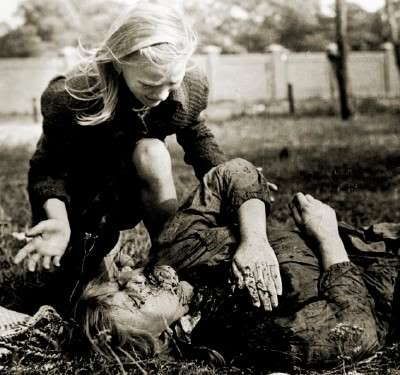 It's hard to see, but this is what ethnic cleansing looks like, |
The author Joseph Persico tells in his book Nuremberg - Infamy On Trial how an interrogation took place in the Palace Of Justice shortly after the war ended:
| “ |
Albert Goering was an engineer by profession; he was a year younger than his brother, Hermann, and bore not the slightest resemblance to him. GI fatigues hung on his skeletal frame like clothes on a coat hanger. He was bald and his skin was sallow. That morning a prison doctor had counted over seventy carbuncles on his back and neck; some of them poked above his collar. Albert Goering immediately began complaining about the injustice of his plight. He had always been an anti-Nazi. He had voluntarily approached the Americans the day after the war ended, and they had rewarded him by throwing him into jail. That was no way to treat a man who had been arrested by the Gestapo four times for helping Jews and for calling Hitler a criminal ... Albert ... probably could do himself good by denouncing his brother. But he just could not bring himself to do it. Hermann had bailed him out every time the Gestapo had arrested him. Hermann had gotten him a good job at the Hungarian office of the Skoda works. Though Hermann considered this brother the black sheep of the family, he had been good to him. |
” |
During the post-war-years Albert Goering had many difficulties, the name Goering followed him around with the opposite effect it had before. It is reported that grateful survivors, rescued by Albert Goering, are who helped him survive remaining, bitter years of joblessness. When he did work in the post-war years, it was as a writer and translator. As Bülow points out, he lived in a modest flat in Munich far from the baronial splendour of his childhood. After several marriages, he passed away in 1966.
 |
Louis Bülow closed with this fitting statement: Albert Goering proved that humanism knows no borders, no race, no family ties. Beautiful and true, it is nationalism that blinds people, along with the restraints placed upon their minds by religious training, and cultural values fed to them by a soulless media that accepts war crimes as second nature as long as the only recipients are Arabs, or Jews, or Hindus, or whatever the unpopular band of people is at the time.
After immersing myself in the horror of the Jewish struggle once again, I am horrified over what they went through; all of the Holocaust survivors, they know what it is like to be branded a terrorist (just one of many terms used to describe Jews in the Third Reich) and to live in a fenced off poverty zone never knowing from one day to the next if the enemy is going to kill you.
References:
[1] Oscar Schindler
[2] The Good Brother A True Story of Courage - goering.dk
[3] The Warlord and the Renegade by James Wyllie - Good Reads
[4] The Warlord and the Renegade [Hardcover] - James Wyllie Amazon.com
[5] Germany's Jewish Knights of the Air
[6] www.auschwitz.dk
[7] The Hitler Kiss A Memoir Of The Czech Resistance, by Christina Vella and Radomir Luza - Amazon.com
 Tim King in 2008, covering the Iraq War |
Tim King has more than twenty years of experience on the west coast as a television news producer, photojournalist, reporter and assignment editor. Tim is Salem-News.com's Executive News Editor. His background includes covering the war in Afghanistan in 2006 and 2007, and reporting from the Iraq war in 2008. Tim is a former U.S. Marine.
Tim holds awards for reporting, photography, writing and editing from The Associated Press the National Coalition of Motorcyclists, the Oregon Confederation of Motorcycle Clubs, Electronic Media Association and The Red Cross In a personal capacity, Tim has written 2,026 articles as of March 2012 for Salem-News.com since the new format designed by Matt Lintz was launched in December, 2005.
Serving readers with news from all over the globe, Tim's life is literally encircled by the endless news flow published by Salem-News.com, where more than 100 writers contribute stories from 20+ countries and regions.
Tim specializes in writing about political and military developments worldwide with an emphasis on Palestine and Sri Lanka, Iraq and Afghanistan. You can write to Tim at this address: tim@salem-news.com. Visit Tim's Facebook page (facebook.com/TimKing.Reporter)
View articles written by Tim King
Articles for March 3, 2012 | Articles for March 4, 2012 | Articles for March 5, 2012
Quick Links
DINING
Willamette UniversityGoudy Commons Cafe
Dine on the Queen
Willamette Queen Sternwheeler
MUST SEE SALEM
Oregon Capitol ToursCapitol History Gateway
Willamette River Ride
Willamette Queen Sternwheeler
Historic Home Tours:
Deepwood Museum
The Bush House
Gaiety Hollow Garden
AUCTIONS - APPRAISALS
Auction Masters & AppraisalsCONSTRUCTION SERVICES
Roofing and ContractingSheridan, Ore.
ONLINE SHOPPING
Special Occasion DressesAdvertise with Salem-News
Contact:AdSales@Salem-News.com


Salem-News.com:

googlec507860f6901db00.html
Terms of Service | Privacy Policy
All comments and messages are approved by people and self promotional links or unacceptable comments are denied.
[Return to Top]
©2026 Salem-News.com. All opinions expressed in this article are those of the author and do not necessarily reflect those of Salem-News.com.